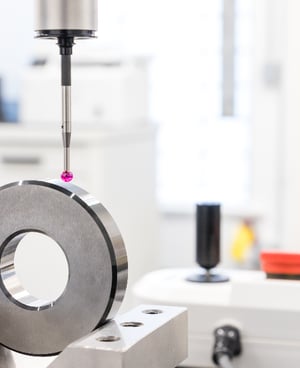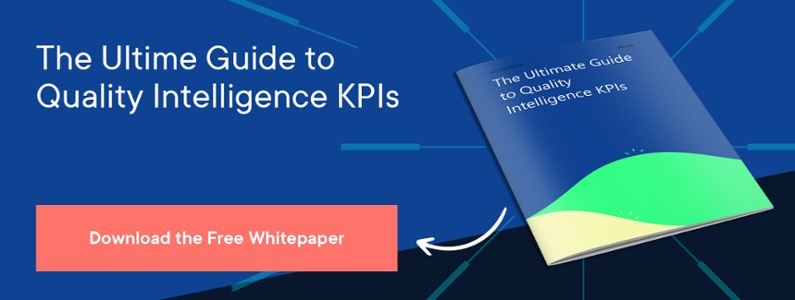In his article published on Qualitymag.com, Mr. Ben Tomic describes the future of Quality inspections in the era of Industry 4.0. He sees the human role shifting from performing measurements to interpreting data and optimizing processes. Automated equipment will perform the actual inspections and convert data to insights, for the quality workers to interpret and use to optimize their products and processes. This fully aligns with our vision that the future of quality management will be smart and omnipresent.
Smart and omnipresent quality inspections
Quality Control inspections will be automated wherever possible. Machines and production lines will be equipped with measurement tools. Eliminating users from the inspection process will take away a huge source of variation. This will most likely have an immediate positive effect on the stability of your measurement system. Tomic even brings up the idea that Measurement System Analysis might become completely irrelevant. That might sound a bit too bold for now, but just extrapolate the trend and you cannot conclude anything else.
Reducing or even eliminating the human factor will introduce a great opportunity to scale your testing. Imagine what a 100% inspection would do for your complaints. Or how much more accurate you could steer production with close to real-time quality metrics.
There is no doubt that data conversion and analysis will be computerized. Operators and quality engineers will be provided with deviation alerts, triggers, and aggregated data, rather than just the raw data that they process themselves today. The human role shifts from operational to tactical and strategic quality management. From inspection to interpretation. And from reacting to anticipating.
Quality data and insights will be accessible and available for your entire organization, not just for the team with direct physical access to the workstation in the lab or at the line. This will contribute to the awareness, involvement, and ownership individuals experience with quality.
We see this happening all the time. Many of our customers, across industries, start integrating their sensors and machines with our quality platform. This is a great example of both smart automation and omnipresence. We help them to transform their raw data into insights and triggers, available for each and everyone involved in real-time.
This trend will be only beneficial for all parties. More data will provide more context. Automated analysis will yield less variation and the job enrichment for the human factor will fulfill the personal ambition of most of the manufacturing team.
Quality 4.0
Tomic defines Quality 4.0 as a subset of Industry 4.0, integrating the key aspects of Industry 4.0 with traditional Quality tools and methodologies, to achieve better operational excellence, overall performance, and innovation. He also stresses it is not just technology or digitization. Quality 4.0 is the combination of people, processes, and technologies accomplishing these goals. This definition aligns with our Quality Intelligence maturity model. Our concept of Quality Intelligence revolves around two key attributes: omnipresence and smart automation.
Omnipresence
Quality is not created at the quality department. Quality results from each step in the process chain. Thus your quality management should be visible and present in each and every step of your process (and your supply chain!). Only with awareness, involvement, and ownership of quality throughout the organization will you be able to deliver true quality products or services. The weakest link in your chain determines your quality.
Smart automation
The transition from ad-hoc and responsive quality management towards smart and anticipative quality management will prevent waste and deviations while saving time. Quality operators or engineers will be informed of sliding processes before the process deviates. This helps them to anticipate and prevent, rather than to react and correct. These efforts will drive first time right.
We visualize this concept of Quality Intelligence with this model.
Quality 4.0 vs Quality Intelligence?
So how do these two terms, Quality 4.0 and Quality Intelligence, relate? Whatever Quality 4.0 means for your factory, it will not be the last step in your continuous improvement. How long before the blogosphere picks up the idea of Quality 5.0? If the developments of the last 10 or 20 years are anything to go by: a lot sooner than we think is possible.
It is more helpful to think of Quality 4.0 as part of a continuum of change in quality management. You want your factory to have state-of-the-art Quality Management processes, and to be best-placed to take advantage of future technological developments, whatever they may be. Actually, that is all Quality 4.0 can ever be in the present.
To get away from the over-simplification (and over-complication) of Quality 4.0, we prefer to talk about Quality Intelligence. This term is not unique to us, but we do add a dose of Dutch practicality, common sense, and directness to it.
How to prepare for Quality Intelligence?
In this era of smart manufacturing, quality will become smart as well. This transition will not happen overnight and this will not happen in a linear way, but we know that integration and automation play a key role. This white paper presents a springboard to change and asks organizations to self-assess to what extent they are ready for Quality Intelligence and to leverage tomorrow’s possibilities.



